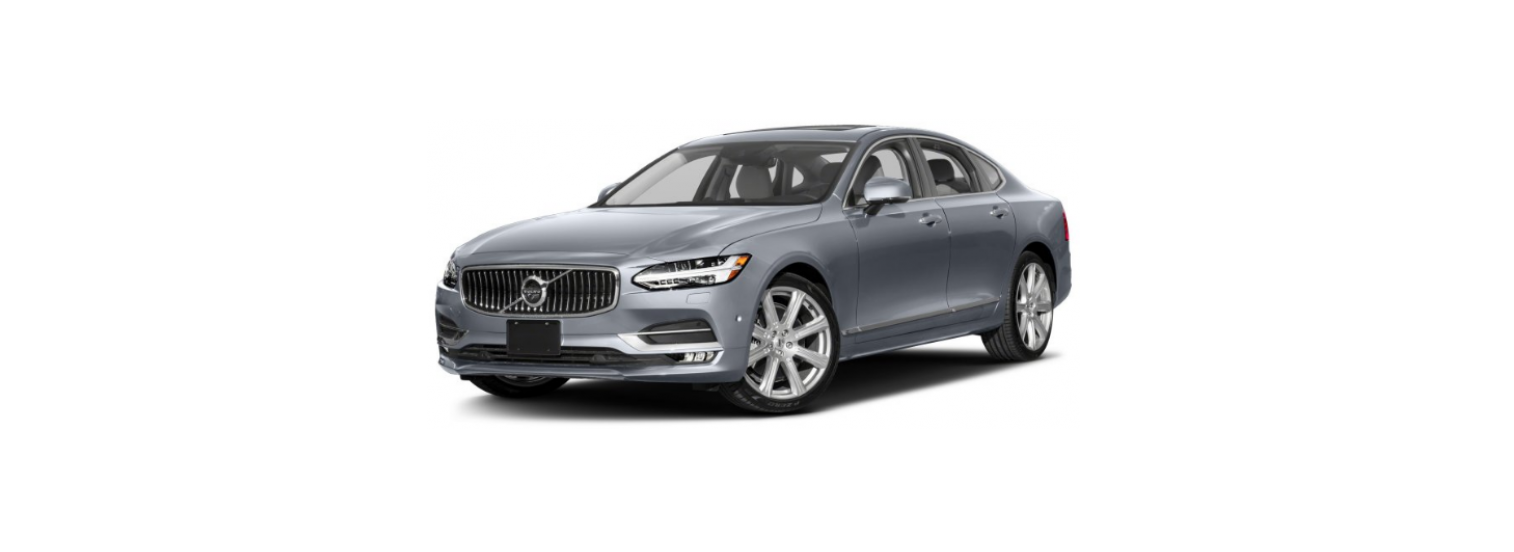2022 Volvo S90 Cargo area

Cargo area
Inside the car’s cargo area, it is possible to secure the load so that it stays in place while driving.
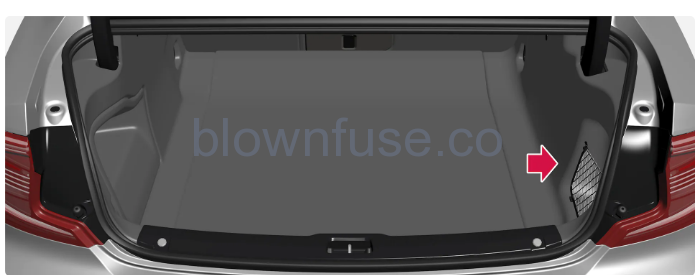
Cargo area with mesh pocket (Option/accessory.) or side panel. With folding (Option/accessory.) backrests in the rear seat, the cargo area can be made more spacious. There are load retaining eyelets and bag holders available for holding the load securely in place. The car’s towing eye and puncture repair kit or spare wheel (Option/accessory.) are stored under the cargo area floor.
Bag hooks
Bag hooks keep carrier bags in place and prevent them from overturning and spreading their contents across the cargo area.
Along the sides
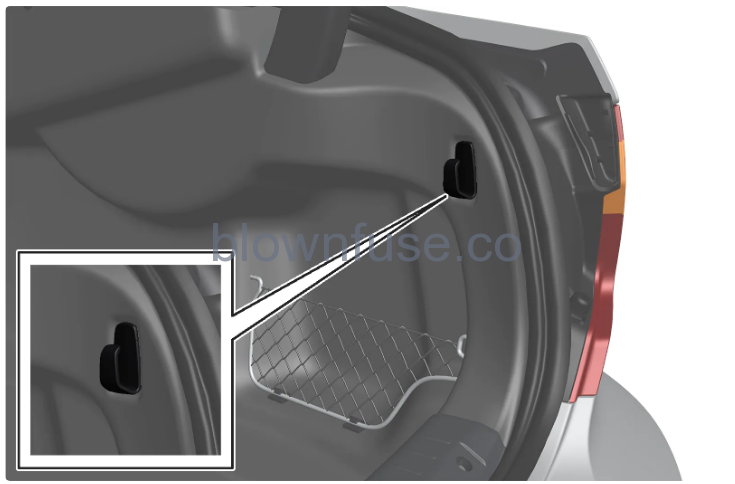 The figure is schematic – parts may vary depending on car model. There is a bag hook in the side panel on each side of the cargo area.
The figure is schematic – parts may vary depending on car model. There is a bag hook in the side panel on each side of the cargo area.
The bag hooks may be loaded with a maximum of 5 kg (11 lbs).
First aid kit
(Option/accessory.)
The first aid kit contains first aid equipment. Store the first aid kit in a suitable place in the cargo area.
Load retaining eyelets
(Option/accessory.)
Use the load retaining eyelets to attach straps in order to anchor items in the cargo area.
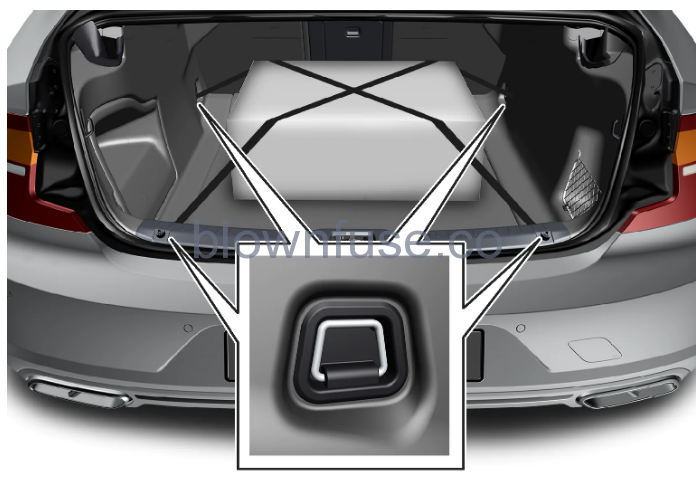
Hard, sharp and heavy objects that are loose or protrude may cause injury during heavy braking. Always secure large and heavy objects with a seatbelt or cargo retaining straps.
Warning triangle
Use the warning triangle to warn other road users if the car is stationary in traffic. Also activate the hazard warning flashers.
The warning triangle is fitted with two clips on the inside of the boot lid.
Folding up the warning triangle
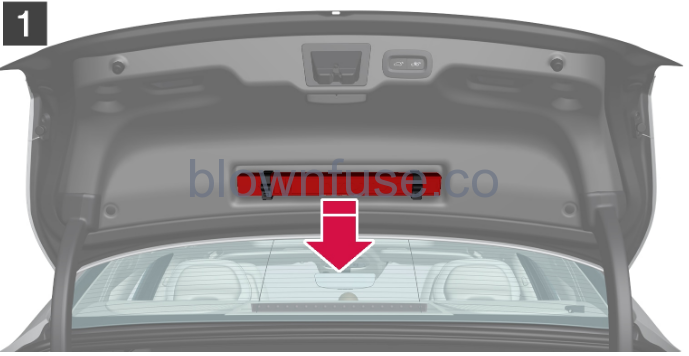
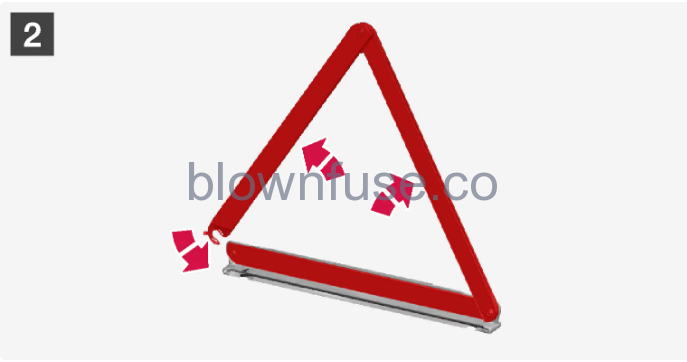
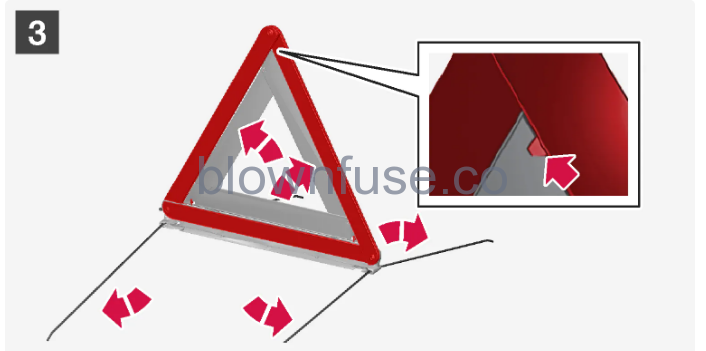
- Remove the warning triangle’s case by opening both latches.
- Remove the warning triangle from the case, unfold it and put the ends together.
- Fold out the warning triangle’s support legs.
Follow the regulations for the use of a warning triangle. Position the warning triangle in a suitable place with regard to traffic. Replace the warning triangle with case on the inside of the boot lid after use.
There is a button on the key to unlock the boot lid only.
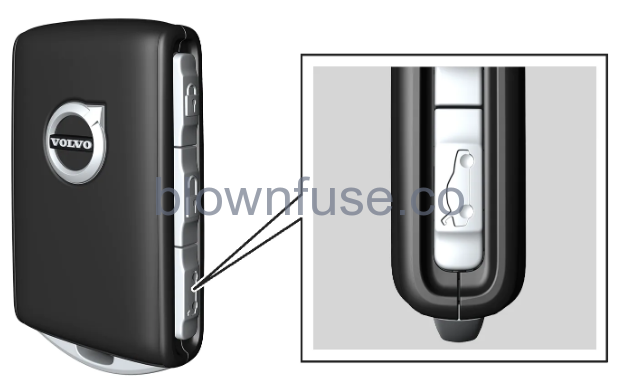
Press the key’s ![]() button.
button.
- The boot lid is unlocked but remains closed.
- The side doors are still locked and the alarm is armed. (Option/accessory.) The lock and alarm indicator on the instrument panel extinguishes in order to show that the entire car is not locked.
- You can open the boot lid by gripping the rubberised pressure plate underneath its lower edge.
- If the boot lid is not opened within 2 minutes then it is relocked and the alarm is re-armed.
Power operated boot lid (Option/accessory.)
Hold the key’s ![]() button depressed for a couple of seconds. The boot lid opens mechanically while the side doors remain locked and their alarm functions armed. (Option/accessory.)
button depressed for a couple of seconds. The boot lid opens mechanically while the side doors remain locked and their alarm functions armed. (Option/accessory.)
Operating the boot lid with foot movement
(Option/accessory.)
Being able to open and close the boot lid with a foot movement under the rear bumper makes things easier when your hands are full.
If the car is equipped with keyless locking and unlocking (Option/accessory.) then you can open the boot lid with a foot movement. For closing, the car also needs to be equipped with power operated boot lid. (Option/accessory.)
The foot-operated boot lid function is available in two versions:
- Only opening with foot movement.
- Both opening and closing with foot movement.
Note that the function for closing with foot movement requires power operated boot lid. (Option/accessory.)
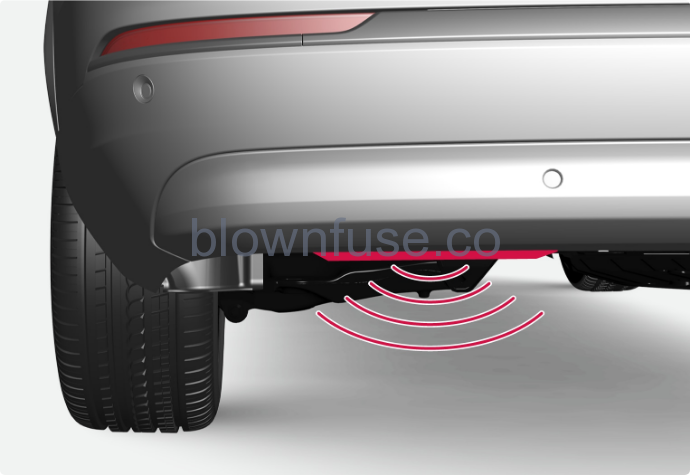
The sensor is positioned to the left of centre in the bumper. One of the car’s keys must be within range behind the car, approx. 1 metre (3 feet), for activation. This also applies if the car is unlocked.
Opening and closing with foot movement
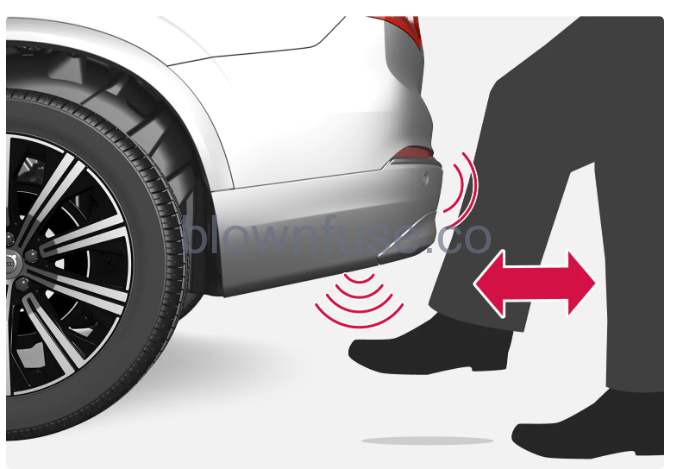
- Kicking motion within the detector’s activation area.
- Make one forward kicking motion under the left part of the rear bumper. Then take a step back. The bumper must not be touched.
- A short acoustic signal sounds when opening and closing is activated – the boot lid is opened/closed.
- If several kicking motions take place without an approved key being located behind the car, opening or closing will not be possible until after a certain delay.
- Do not leave your foot positioned under the car during the kicking motion. This could cause activation to fail.
Cancel closing with a foot movement
- Make one forward kicking motion while closing is in progress in order to stop the movement of the boot lid. (Option/accessory.)
- The movement of the boot lid is stopped and it returns to fully open. The boot lid can then be operated manually.
- The key does not have to be in the vicinity of the car to cancel closing.
Make sure you keep the area around the foot movement detector clean. A build-up of dirt, ice or snow may disrupt its function.
Pay attention to the possibility that the system may be activated in a car wash if the key is within range.
Unlocking the boot lid from the inside of the car
The boot lid can be unlocked from inside the car using a button beside the steering wheel on the instrument panel.
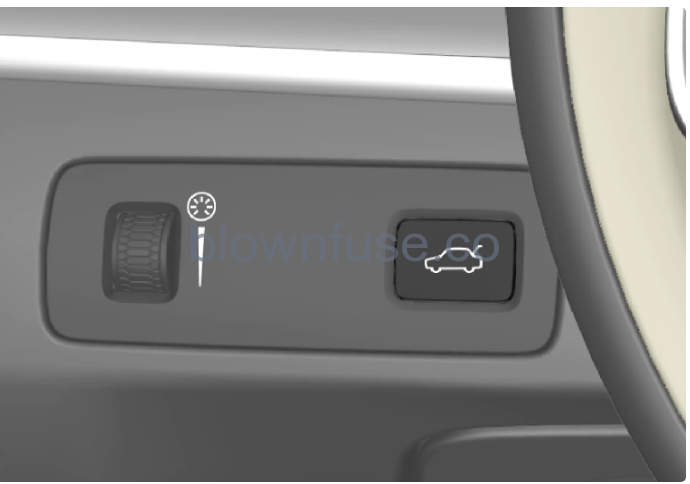
Press the ![]() button on the instrument panel. The boot lid is unlocked and can be opened from the outside.
button on the instrument panel. The boot lid is unlocked and can be opened from the outside.
The buttons on the lower edge of the boot lid can be used to make the car switch off and lock automatically.
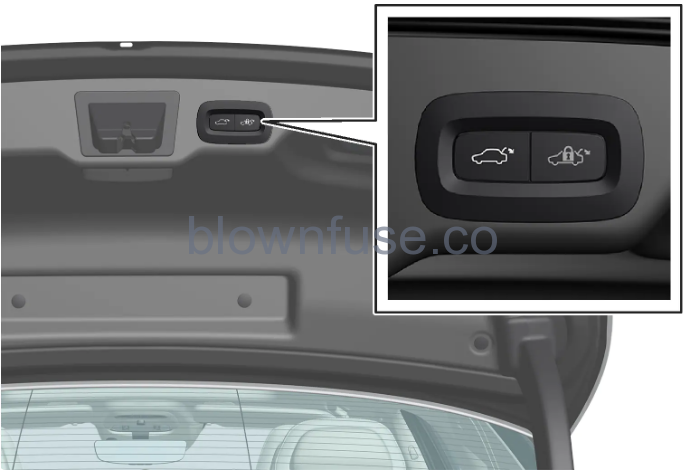
Location of button on the underside of the boot lid.
During manual boot lid operation, open or close it slowly. Do not use force to open/close it if there is resistance. It may be damaged and stop working correctly.
Closing (Applies to cars with power operated boot lid.)
Press the ![]() button on the underside of the boot lid.
button on the underside of the boot lid.
The boot lid closes automatically and remains unlocked.
Note
- The button is active 24 hours after the hatch has been left open. Thereafter, it must be closed manually.
- If the flap has been open for more than 30 minutes, it will close at a slow speed.
Closing and locking (Applies to cars with keyless locking/unlocking and power operated boot lid.)
Press the ![]() button on the underside of the boot lid. The boot lid is closed automatically and the car is locked. (All doors must be closed for locking the car.)
button on the underside of the boot lid. The boot lid is closed automatically and the car is locked. (All doors must be closed for locking the car.)
Note
- One of the car’s keys must be within range for locking and unlocking to work.
- When using keyless (Option/accessory.) locking or closing, three signals will sound if the key is not sufficiently close to the tailgate.
Cancel closing
- Press the button on the instrument panel.
- Press the key’s button.
- Press the closing button on the underside of the boot lid. (Applies to cars with power operated boot lid.)
- Press the rubberised pressure plate beneath the outside handle.
- Using a kicking motion. (Option/accessory.)
The movement of the boot lid is stopped, and it returns to fully open. The boot lid can then be operated manually.
Pinch protection
If something with sufficient resistance prevents the boot lid from closing then the pinch protection is activated. The movement is stopped, the boot lid returns to fully open and a long signal sounds.
Warning
- Pay attention to the risk of crushing when closing.
- Check that there is nobody near the boot lid before starting to close it as a crush injury may have severe consequences.
- Always operate the boot lid with caution.
Keyless unlocking of boot lid
(Option/accessory.)
Note
One of the car’s keys must be within range behind the car for unlocking to work. The boot lid is held closed by an electrical lock. To open:
- Press gently on the rubberised pressure plate beneath the boot lid handle.
- The lock is released.
- Lift by the outside handle in order to open the boot lid.
Important
- Handle the rubber panel with care to avoid damage to its electrical contact. Minimal force is required for activation.
- Do not exert the lifting force on the rubber panel when opening – lift the handle.
It is also possible to open the boot lid with a kicking motion under the rear bumper.
Do not drive with an open boot lid! Toxic exhaust fumes could be drawn into the car through the cargo area.
Fuses in cargo area
The fuse box with the cargo area fuses is located behind a panel on the right side.
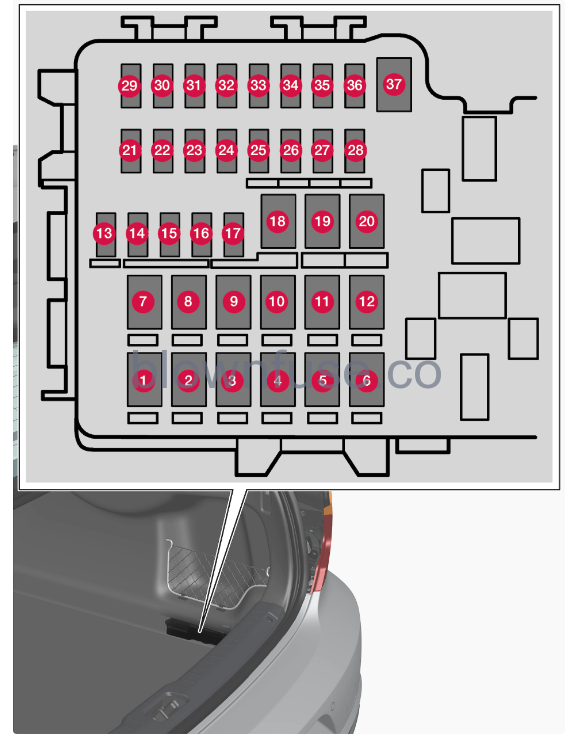
- The central electrical unit is located behind the panel on the right-hand side.
- Special pliers are housed on the inside of the cover to facilitate replacement of tripped fuses.
- The fuse box in the engine compartment provides space for several spare fuses.
Positions
- The positions of the fuses are shown on the inside of the cover. Functions and components in the fuse table cover several models and engine alternatives. A fuse description can therefore apply to fewer than those in the table, or be completely missing, depending on how the car is equipped.
- If a position has multiple table values, it is due to variations in equipment level. In which case, follow the value of the fuse being replaced. In the event of doubt – contact a workshop. An authorised Volvo workshop is recommended.
| Function | Ampere | Type | |
|---|---|---|---|
| 1 | Rear window defroster | 30 | MCase (This type of fuse should be replaced by a workshop. An authorised Volvo workshop is recommended.) |
| 2 | Central electronic module | 40 | MCase (This type of fuse should be replaced by a workshop. An authorised Volvo workshop is recommended.) |
| 3 | Compressor, air suspension | 40 | MCase (This type of fuse should be replaced by a workshop. An authorised Volvo workshop is recommended.) |
| 4 | Lock motor backrest, right rear | 15 | MCase (This type of fuse should be replaced by a workshop. An authorised Volvo workshop is recommended.) |
| 5 | – | – | MCase (This type of fuse should be replaced by a workshop. An authorised Volvo workshop is recommended.) |
| 6 | Lock motor backrest, left rear | 15 | MCase (This type of fuse should be replaced by a workshop. An authorised Volvo workshop is recommended.) |
| 7 | Door module, right rear | 20 | MCase (This type of fuse should be replaced by a workshop. An authorised Volvo workshop is recommended.) |
| 8 | Control module for reduction of nitrous oxides (diesel) | 30 | MCase (This type of fuse should be replaced by a workshop. An authorised Volvo workshop is recommended.) |
| 9 | Power operated boot lid | 25 | MCase (This type of fuse should be replaced by a workshop. An authorised Volvo workshop is recommended.) |
| 10 | Door module, right front | 20 | MCase (This type of fuse should be replaced by a workshop. An authorised Volvo workshop is recommended.) |
| 11 | Towbar control module | 40 | MCase (This type of fuse should be replaced by a workshop. An authorised Volvo workshop is recommended.) |
| 12 | Seatbelt pretensioner, right | 40 | MCase (This type of fuse should be replaced by a workshop. An authorised Volvo workshop is recommended.) |
| 13 | Internal relay coils | 5 | Micro |
| 14 | Control module for reduction of nitrous oxides (diesel) | 15 | Micro |
| 15 | Door module, left rear | 20 | Micro |
| 16 | Alcohol lock | 5 | Micro |
| 17 | – | – | Micro |
| 18 | Towbar control module | 25 | MCase (This type of fuse should be replaced by a workshop. An authorised Volvo workshop is recommended.) |
| Accessory module | 40 | ||
| 19 | Door module, left front | 20 | MCase (This type of fuse should be replaced by a workshop. An authorised Volvo workshop is recommended.) |
| 20 | Seatbelt pretensioner, left | 40 | MCase (This type of fuse should be replaced by a workshop. An authorised Volvo workshop is recommended.) |
| 21 | Parking camera | 5 | Micro |
| 22 | Rear lighting (backup) | 10 | Micro |
| 23 | – | – | Micro |
| 24 | Position prepared for special vehicle | 5 | Micro |
| 25 | – | – | Micro |
| 26 | – | – | Micro |
| 27 | – | – | Micro |
| 28 | Seat heating, left rear | 15 | Micro |
| 29 | – | – | Micro |
| 30 | Blind Spot Information (BLIS) | 5 | Micro |
| 31 | – | – | Micro |
| 32 | Seatbelt pretensioner, left | 5 | Micro |
| 33 | Actuator, exhaust system (petrol) | 5 | Micro |
| 34 | – | – | Micro |
| 35 | Control module All Wheel Drive (AWD) | 15 | Micro |
| 36 | Seat heating, right rear | 15 | Micro |
| 37 | – | – | MCase (This type of fuse should be replaced by a workshop. An authorised Volvo workshop is recommended.) |
